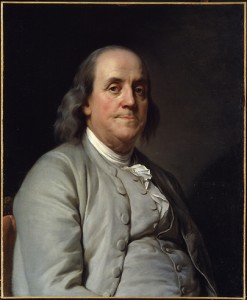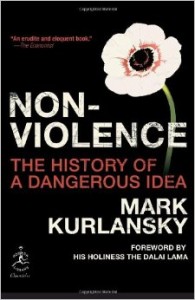Last night while cruising through the foggy mountains on the way home from a couple of… “gladitorial” Hellbound? screenings at Abilene Christian University, I caught the tail end of the first Fragile Freedoms lecture series on CBC Radio’s most excellent Ideas program. The speaker was British philosopher A. C. Grayling, who provided a brief survey of the philosophical origins behind modern ideas about individual rights and liberties in the West.
 In his closing remarks, he quoted Benjamin Franklin, who said, “Those who surrender freedom for security will not have, nor do they deserve, either one.”
In his closing remarks, he quoted Benjamin Franklin, who said, “Those who surrender freedom for security will not have, nor do they deserve, either one.”
As someone who crosses the Canada/US border and flies frequently, the comment hit home, because every time I do either of those things, I am transformed from “Kevin Miller, average law-abiding citizen” to “Kevin Miller, potential terrorist and global criminal mastermind.” (The latter part would be a bit of a stretch if not for this.) In other words, for the sake of security, a certain measure of my freedom (and dignity) is taken away. I know, talk about First World problems. But you try taking off your belt and shoes, taking out your laptop and liquids and gels and putting them all away/back on again while wearing a cast on your left hand–after that cast has been swabbed for potential bomb-making materials, of course.
Minor inconveniences aside (I don’t want the plane I’m on to blow up in the sky either), as Grayling pointed out, the moment a government makes security more important than freedom, it’s all over, because now everything and everyone becomes a potential threat. Hence the “need” for preemptive strikes, the NSA vacuuming up every sniff of data they can find, the US government seeing a demon behind every door, grannies undergoing full body scans at airports and all sorts of other “necessary” evils.
I know what you’re thinking. H0w can we be free if we’re not secure? To which I respond, how can we be secure if we aren’t free? How long will it be before we adopt some sort of “pre-crime” system, as in Minority Report, where people are picked up for crimes they might commit? That may sound far-fetched, but if we continue down the road we’re on, it’s only a matter of time. All we’re waiting for is technology to catch up to our paranoia. And something tells me it may already be there…
Of course, this brings up a host of big questions, such as, “What is freedom?” and “What does it mean to be secure?” Secure from what? Secure to do what? As Thomas Merton once said,
To some men peace merely means the liberty to exploit other people without fear of retaliation or interference. To others peace means the freedom to rob others without interruption. To still others it means the leisure to devour the goods of the earth without being compelled to interrupt their pleasure to feed those whom their greed is starving. And to practically everybody peace simply means the absence of any physical violence that might cast a shadow over lives devoted to the satisfaction of their animal appetites for comfort and pleasure. Many men like these have asked God for what they thought was “peace” and wondered why their prayer was not answered. They could not understand that it actually was answered. God left them with what they desired, for their idea of peace was only another form of war.
Yikes. Those words certainly make me squirm. And I’m not even a Republican!
Just to be clear, I’m not trying to create a false dichotomy here–security vs. freedom. I think it’s more a question of ends vs. means. At the moment, the powers-that-be are convinced that freedom is the end, and the quest for security the means. I’m simply suggesting they could have things ass-backwards. After all, even if we go back to the Garden of Eden story, things were going along just fine until the desire for security entered the mix.
Not that I want to go all “Old Testament” on you, but judging from some of my encounters with the TSA and CBP, I’m not so sure some of their officers wouldn’t mind…











